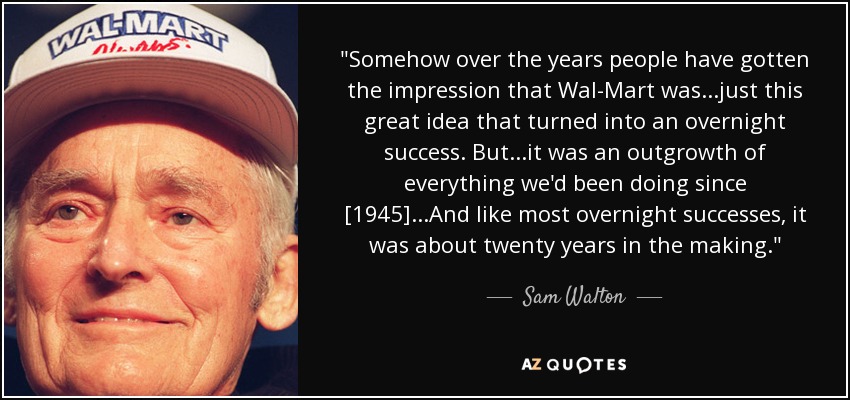 It’s easy to forget Jim Collins in Good to Great shared great companies didn’t become great overnight. It took slow, steady momentum, continuous, consistent pushes on their flywheel, eventually leading to breakthrough. See 12 QUESTIONS to Take You From Good To Great - #1 & 2 for Collins' definition of Greatness.
It’s easy to forget Jim Collins in Good to Great shared great companies didn’t become great overnight. It took slow, steady momentum, continuous, consistent pushes on their flywheel, eventually leading to breakthrough. See 12 QUESTIONS to Take You From Good To Great - #1 & 2 for Collins' definition of Greatness.
Our progress requires slow, steady, progress to achieve success.
“It’s true that I was 44 when we opened our first Walmart in 1962…and like most other overnight successes, it was about 20 years in the making.” ~ Sam Walton
In Measuring ROI - Create Marginal Gains we shared the remarkable story of Sir David Brailsford, formerly performance director of British Cycling, who turned Great Britain’s cycling team from one of the worst to the best in just 2 years. His focus was on small gains. 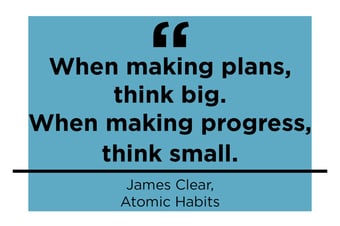 In Atomic Habits, James Clear shares this story in much greater detail, as well as his own recovery from a damaging face/brain injury to show how small habits can make a significant difference.
In Atomic Habits, James Clear shares this story in much greater detail, as well as his own recovery from a damaging face/brain injury to show how small habits can make a significant difference.
Habits are the compound interest of self-improvement. The same way money multiplies through compound interest, the effects of your habits multiply as you repeat them. On any given day they seem to make little difference, and yet the impact these small habits deliver over the months and years can be enormous. Only when you look back two, five, or perhaps ten years later do the value of good habits and the cost of bad ones become significant.
Watch James Clear explain in 8 minutes how, and why environment helps to achieve success:
Habits Math
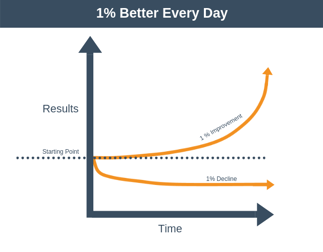 Suppose you can get just 1 percent better each day? You’d end up with results nearly 37 times better after one year.
Suppose you can get just 1 percent better each day? You’d end up with results nearly 37 times better after one year.
Conversely, if you get 1 percent worse each day for one year, you’ll decline nearly down to zero. What starts as a small win or a minor setback accumulates into something much more.
See Chart: The effects of small habits compound over time.
What Matters
Clear notes, “it doesn’t matter how successful or unsuccessful you are right now. What matters is whether your habits are putting you on the path toward success. You should be far more concerned with your current trajectory than with your current results. If you’re a millionaire but you spend more than you earn each month, then you’re on a bad trajectory. If your spending habits don’t change, it’s not going to end well. Conversely, if you’re broke, but you save a little bit every month, then you’re on the path toward financial freedom—even if you’re moving slower than you’d like.
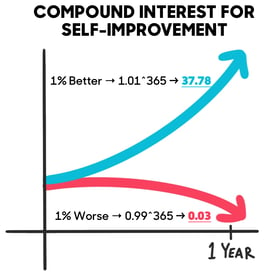 Your outcomes are a lagging measure of your habits. Your net worth is a lagging measure of your financial habits. Your weight is a lagging measure of your eating habits. Your knowledge is a lagging measure of your learning habits. Your clutter is a lagging measure of your cleaning habits. You get what you repeat.
Your outcomes are a lagging measure of your habits. Your net worth is a lagging measure of your financial habits. Your weight is a lagging measure of your eating habits. Your knowledge is a lagging measure of your learning habits. Your clutter is a lagging measure of your cleaning habits. You get what you repeat.
Time magnifies the margin between success and failure. It will multiply whatever you feed it. Good habits make time your ally. Bad habits make time your enemy.”
Why it’s so HARD to Build Habits That Last
We can get started on a new habit, motivated to make it stick, yet when we fail to see any tangible results inevitably, we decide to stop. I see this frequently with customers, who start, stop, start, stop. They fail to understand why they don’t see improvement.
Clear shares a story about an ice cube in a room at 26 degrees. If you slowly raise the temperature to 27, 28, 29, 30, 31, and then 32 degrees, you won’t see any change in the ice cube. Then suddenly at 32 degrees, it begins to melt.
The one-degree shift, no different from the temperature increases before it, unlocks a huge change.
Breakthrough moments are often the result of many previous actions, which build up the potential required to unleash a major change. This pattern shows up everywhere. Cancer spends 80 percent of its life undetectable, then takes over the body in months. Bamboo can barely be seen for the first five years as it builds extensive root systems underground before exploding ninety feet into the air within six weeks.
If you struggle to build a good habit or break a bad one, it is not because you lost your ability to improve. More than likely it’s because you haven’t yet crossed the Plateau of Latent Potential.
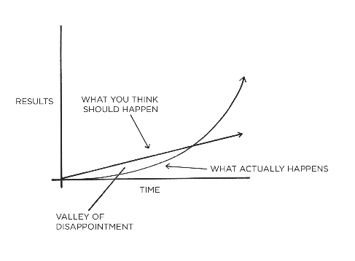 Study the graph here. We expect progress to be linear, yet our efforts are frequently delayed. The “valley of disappointment where you feel discouraged is not wasted, it’s simply being stored until later when you see the full value of all your efforts.”
Study the graph here. We expect progress to be linear, yet our efforts are frequently delayed. The “valley of disappointment where you feel discouraged is not wasted, it’s simply being stored until later when you see the full value of all your efforts.”
When you finally break through the Plateau of Latent Potential, people will call it an overnight success.
Remember this. Clear notes, “Big things come from small beginnings. The seed of every habit is a single, tiny decision. But as that decision is repeated, a habit sprouts and grows stronger. Roots entrench themselves and branches grow. The task of breaking a bad habit is like uprooting a powerful oak within us. And the task of building a good habit is like cultivating a delicate flower one day at a time.”
To create an environment where everyone is inspired to give their best, contact Positioning Systems today to schedule a free exploratory meeting.
Growth demands Strategic Discipline.
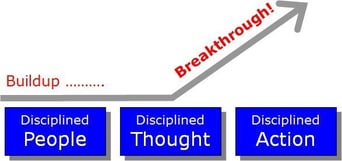 Building an enduring great organization requires disciplined people, disciplined thought, disciplined action, superior results, producing a distinctive impact in the world.
Building an enduring great organization requires disciplined people, disciplined thought, disciplined action, superior results, producing a distinctive impact in the world.
Discipline sustains momentum, over a long period of time, laying the foundations for lasting endurance.
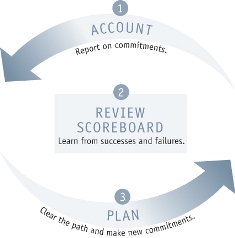 A winning habit starts with 3 Strategic Disciplines: Priority, Metrics, and Meeting Rhythms. Forecasting, accountability, individual, and team performance improve dramatically.
A winning habit starts with 3 Strategic Disciplines: Priority, Metrics, and Meeting Rhythms. Forecasting, accountability, individual, and team performance improve dramatically.
Meeting Rhythms achieve a disciplined focus on performance metrics to drive growth.
Let Positioning Systems help your business achieve these outcomes on the Four most Important Decisions your business faces:
|
DECISION |
RESULT/OUTCOME |
|
PEOPLE |
|
|
STRATEGY |
|
|
EXECUTION |
|
|
CASH |
|
Positioning Systems helps mid-sized ($5M - $250M+) business Scale-UP. We align your business to focus on Your One Thing! Contact dwick@positioningsystems.com to Scale Up your business! Take our Four Decisions Needs Assessment to discover how your business measures against other Scaled Up companies. We’ll contact you.
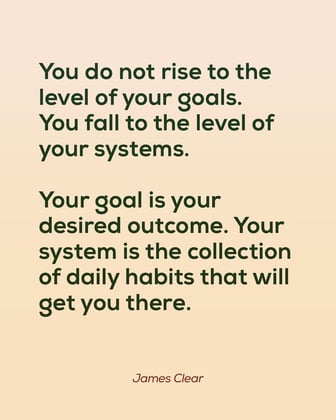 NEXT BLOG – You Do Not Rise to the Level of Your Goals. You Fall to the Level of Your Systems
NEXT BLOG – You Do Not Rise to the Level of Your Goals. You Fall to the Level of Your Systems
If goals are the key to success, why doesn’t every athlete who sets a goal win an Olympic Gold Medal? Goals are about the results you want to achieve. Systems are about the processes leading to those results. My personal journey through cancer provides an example of why systems are more important than goals. Next blog we’ll learn why three-time Super Bowl-winning coach Bill Walsh believed, “The score takes care of itself.”






.jpeg?width=150&height=135&name=Hand%20with%20marker%20writing%20the%20question%20Whats%20Next_%20(1).jpeg)

